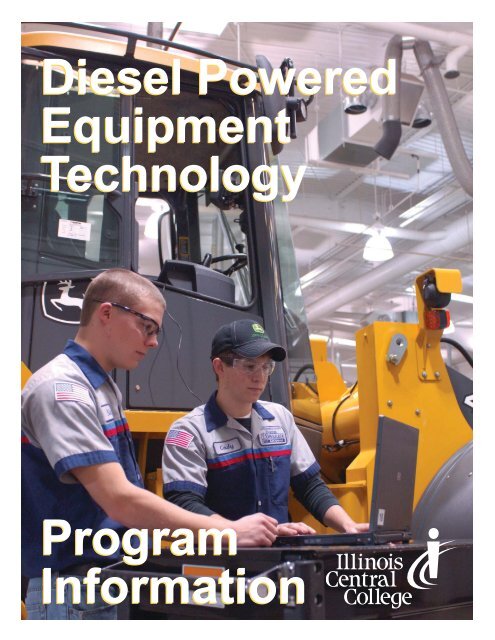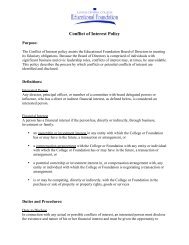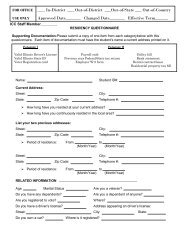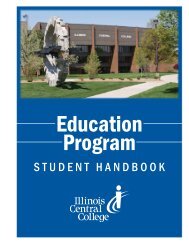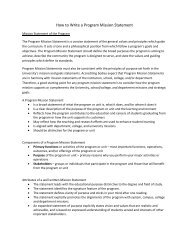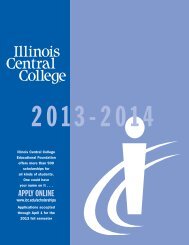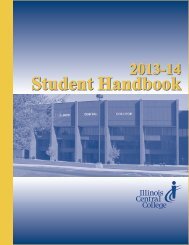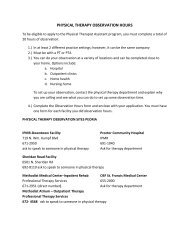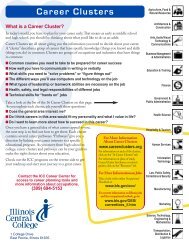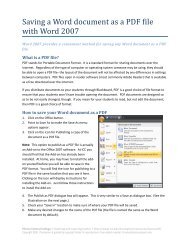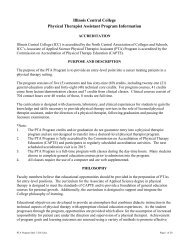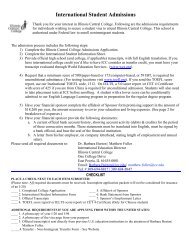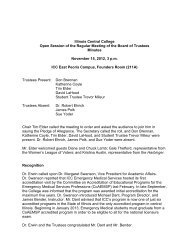Diesel Powered Equipment Technology - Illinois Central College
Diesel Powered Equipment Technology - Illinois Central College
Diesel Powered Equipment Technology - Illinois Central College
Create successful ePaper yourself
Turn your PDF publications into a flip-book with our unique Google optimized e-Paper software.
<strong>Diesel</strong> <strong>Powered</strong><strong>Equipment</strong><strong>Technology</strong>ProgramInformation
Agricultural/Industrial Technologies Department1 <strong>College</strong> DriveEast Peoria, IL 61635-0001309/694-5616 • Fax 309/694-5799Planning Your FutureAs you plan your training for the world of work, you are naturallyconcerned with what the future may hold for you. You, your parents,counselors, and others have probably spent some time discussing thecosts involved in pursuing a technical college education, the programof study you might take, and most importantly, your desires andplans for employment after you receive your training. When makingplans and decisions, you should include consideration of all factors.This booklet is designed to help answer common questions you mayhave about the <strong>Illinois</strong> <strong>Central</strong> <strong>College</strong> <strong>Diesel</strong> <strong>Powered</strong> <strong>Equipment</strong><strong>Technology</strong> Program. Please let us know if there is other informationwe can provide for you.We urge you to read all of this booklet before you apply for the <strong>Diesel</strong><strong>Powered</strong> <strong>Equipment</strong> <strong>Technology</strong> Program. This will also be helpful toyou now and after you are accepted as a student.Michael DaughertyProfessorJeff GardnerInstructor
Table of ContentsAnswers To Your QuestionsA. Program Description . . . . . . . . . . . . . . . . . . . . . . . . . . . . . . . . . . . . . . . . . . . . . . . . . . . 1B. Admissions . . . . . . . . . . . . . . . . . . . . . . . . . . . . . . . . . . . . . . . . . . . . . . . . . . . . . . . . . . . . 5C. Expenses . . . . . . . . . . . . . . . . . . . . . . . . . . . . . . . . . . . . . . . . . . . . . . . . . . . . . . . . . . . . . 8D. Financial Assistance . . . . . . . . . . . . . . . . . . . . . . . . . . . . . . . . . . . . . . . . . . . . . . . . . . . 13E. Graduate Employment Opportunities . . . . . . . . . . . . . . . . . . . . . . . . . . . . . . . . . . . . 15F. Bright Ideas for Student Success . . . . . . . . . . . . . . . . . . . . . . . . . . . . . . . . . . . . . . . . 19G. Additional Information . . . . . . . . . . . . . . . . . . . . . . . . . . . . . . . . . . . . . . . . . . . . . . . . 21Sequence of Courses . . . . . . . . . . . . . . . . . . . . . . . . . . . . . . . . . . . . . . . . . . . . . . . . . . . . . . . . 22Course Descriptions . . . . . . . . . . . . . . . . . . . . . . . . . . . . . . . . . . . . . . . . . . . . . . . . . . . . . . . . 23Tool Listing . . . . . . . . . . . . . . . . . . . . . . . . . . . . . . . . . . . . . . . . . . . . . . . . . . . . . . . . . . . . . . . 28<strong>Illinois</strong> <strong>Central</strong> <strong>College</strong> Contacts . . . . . . . . . . . . . . . . . . . . . . . . . . . . . . . . . . . . . . . . . . . . . 29Application: Student Applicant Assessment (two copies) . . . . . . . . . . . . . . . . . . . . .Last PagesApplication: <strong>Diesel</strong> <strong>Powered</strong> <strong>Equipment</strong> <strong>Technology</strong> . . . . . . . . . . . . . . . . . . . . .Last PagesApplication: <strong>Illinois</strong> <strong>Central</strong> <strong>College</strong> . . . . . . . . . . . . . . . . . . . . . . . . . . . . . . . . . . .Last Pages
Answers To Your QuestionsA. PROGRAM DESCRIPTION1. What is a <strong>Diesel</strong> <strong>Powered</strong> <strong>Equipment</strong> Service Professional?<strong>Diesel</strong> powered equipment service technicians maintain, diagnose, adjust andrepair equipment used in the agricultural, construction and on-highway truckindustries. Working in dealer service centers, technicians perform preventivemaintenance to keep equipment in optimum working order, evaluate problemsusing specialized computer diagnostic tools and software and perform regularinspections to ensure safe machine operation.Technicians work with all aspects of the machine––this includes:• electronic controlled diesel engines• electrical systems• electronic monitor and controls systems• hydraulics• transmission and final drives• air conditioning systemsTo pursue a career as a diesel powered equipment technician, you should possessmechanical aptitude, manual dexterity, agility, problem-solving skills, computerskills and have the ability to learn to read system schematics and engineeringspecifications.2. What are the objectives of this training?The objectives of the <strong>Diesel</strong> <strong>Powered</strong> <strong>Equipment</strong> <strong>Technology</strong> Programs areas follows:• Develop skills necessary to service and repair agricultural equipment,heavy trucks, and construction equipment.• Develop an understanding of diesel fuel systems, electricity and electronics,hydraulics, transmissions, engines, electronic controls and monitoring systems,and air-conditioning, and apply these principles to the service of diesel poweredequipment.• Develop skills necessary to service transmissions, air-conditioning, engines,electrical systems, electronic control/monitoring systems, hydraulics, anddiesel fuel system components.1
• Expand the student's basic knowledge of shop tools and increase theirproficiency on the use of tools to service equipment. Instill an attitude of safeworking habits to protect the students and others in the workplace.• Develop and expand the student's knowledge of agricultural, heavy truck, andconstruction equipment and provide instruction in the setup and predeliveryof this equipment.• Encourage students to expand their horizons to permit upward mobilitythrough general education and other related learning experiences.• Develop and expand the student's work ethic skills so the student is fullyprepared for the world of work.• Develop an understanding of the service center and parts departmentoperation.3. Is experience in servicing or operating agricultural, heavy truck,and construction equipment necessary?Previous work experience with this equipment is not required but can be verybeneficial. Experience working for a dealer or other service-related jobs will beuseful in attaining the skills and knowledge necessary for achieving a successfulcareer in the diesel powered equipment industry.4. Who manages the <strong>Diesel</strong> <strong>Powered</strong> <strong>Equipment</strong> <strong>Technology</strong> classes?Most technical courses are taught by Michael Daugherty, professor,or Jeff Gardner, instructor. They have over 40 years of combined teachingand service experience with equipment.5. When are classes generally scheduled?Classes are conducted from 8:00 a.m. to 5:00 p.m., Monday through Friday.However, classes for this program have been grouped as much as possible togenerally meet half days for a full week (Monday-Friday) or full days for a shorterweek (Monday-Thursday). Your class schedule will vary from semester tosemester. Some "free periods" follow classes in this schedule within a givenweek, allowing time for lunch and study.6. What courses will I take?2There are five semesters of study and training in the program over a two-yearperiod. Required courses in this program are listed and described in the back ofthis program overview. This curriculum outline is subject to minor changes asdetermined by periodic evaluations completed by the <strong>Diesel</strong> <strong>Powered</strong> <strong>Equipment</strong><strong>Technology</strong> Advisory Council. General education courses are often substituted asdetermined by the student's ability.
7. What is "on-the-job training"?On-the-job training is a required and unique part of the program in the secondyear. During the sophomore year, you will complete eight weeks of on-the-jobtraining during both the fall and spring semesters. You will work in a servicecenter a minimum of 40 hours a week for a salary and receive college credit. Aninstructor will periodically visit you and the dealer over the eight-week periodfor evaluation purposes. Salaries earned from on-the-job training vary from$7,500 to $13,200, depending on previous experience, overtime pay, collegeperformance, and the dealer.On-the-job training is not automatic. For you to become eligible foron-the-job training, you must receive satisfactory evaluations on your secondinstructor-student conference held in your freshman year.On-the-job training is a vital part of the program. It provides a real sense of theworld of work, credentials for future employment consideration, and applicationof what has been learned from college courses. Industry looks favorably towardsstudents who have had O.J.T. as part of their college-technical training.8. Moving into the future<strong>Central</strong> <strong>Illinois</strong> dealers and <strong>Illinois</strong> <strong>Central</strong> <strong>College</strong> <strong>Diesel</strong> <strong>Powered</strong> <strong>Equipment</strong><strong>Technology</strong> are “moving into the future” to meet the changing demands of theindustry. This is a partnership available to <strong>Illinois</strong> <strong>Central</strong> <strong>College</strong> students witha desire to begin their career in sponsoring dealer service centers.9. Dedicated to excellenceIn order to provide students with the latest cutting edge technology, <strong>Central</strong><strong>Illinois</strong> dealers are providing training aids, current equipment such as tractors,combines, and planters along with specialized service tools throughout the twoyears of training. Instructors of the program regularly attend manufacturerservice training programs to bring the latest technology back to the classroom.10. ProfessionalismIn addition to comprehensive technical training, <strong>Illinois</strong> <strong>Central</strong> <strong>College</strong> <strong>Diesel</strong><strong>Powered</strong> <strong>Equipment</strong> <strong>Technology</strong> students are exposed and taught the importanceof work ethic values. In all classes communication, leadership, cooperative,professional and work ethic skills are incorporated and emphasized. Industryhas recognized that an individual with a well-rounded education will most likelysucceed and experience greater upward mobility throughout the student’s career.3
11. Career opportunities<strong>Diesel</strong> powered equipment service technicians work as:• Service technicians• Service managers• Service specialists• Corporate territory service managers• Engineering test technicians• Technical sales professionals12. How will I know this is a quality program?This is a question a prospective student seeking a post-secondary technicaleducation should ask. Visit area dealers who have employed graduates of theprogram. Request an opportunity to view facilities and training aids along withspending a half day or more with students of the program attending class.Bring your parents when you meet the instructor(s) of the program and tourthe facilities. They can be a tremendous asset to asking the right questions.To help you determine if this is a quality program, ask yourself the followingquestions:• How many students are grouped together in the lab environment? In most labenvironments, we put our students in groups of two. Groups of three or moredo not learn as much and do not get as much hands-on training.• Ask to see the training aids used in the classroom discussion and laboratorypractice. How old are these training aids? Are the training aids in goodcondition? How appropriate are these training aids in meeting your careeraspirations?• How much time will you spend gaining hands-on experience in a given course?• Is lab time spent gaining hands-on experience or does the instructordemonstrate service procedures without giving you an opportunity to practicethem?• What will be the total cost of the program?• Does the program provide an internship specific to your career objectives?• Are you given the opportunity to work on "outside" equipment or onlycollege-owned equipment?• How much student-to-instructor contact time is offered in each technical area(i.e., engines, electrical, etc.)?• Does the program provide in-depth training in the diagnosis of engine,electrical, transmission, hydraulic, and air-conditioning?• Will the program give you specific training on agricultural, heavy truck, andconstruction equipment?• How will the money you pay in tuition be used?4At <strong>Illinois</strong> <strong>Central</strong> <strong>College</strong> all your tuition is given back to you in the form ofan education. This tuition is only a small portion of the total cost incurred by the<strong>College</strong> in providing you a quality education. The additional money neededcomes in the form of tax dollars.
4. Can I be accepted for the <strong>Illinois</strong> <strong>Central</strong> <strong>College</strong> <strong>Diesel</strong> <strong>Powered</strong><strong>Equipment</strong> <strong>Technology</strong> Program if I don't live in <strong>Illinois</strong>?Yes. The program will provide training necessary for employment in mostagricultural, heavy truck, and construction equipment service centers in theUnited States. You may be required to pay out-of-state tuition.5. What high school courses are helpful in preparation for the <strong>Diesel</strong> <strong>Powered</strong><strong>Equipment</strong> <strong>Technology</strong> Program?Average or better grades are very important but not necessarily required. Desirablecourses include math, physics, first aid, welding, agriculture, and auto or powermechanics. However, no one is expected to have taken all of these for acceptanceinto the program.6. After applying, how soon will I know if I have been accepted into theprogram?Acceptance or denial letters will be mailed approximately January 31 andApril 30. Should program openings exist following April 1, letters will be mailedas necessary.The deadline for application material submission is December 1 for theJanuary 31 mailing and April 1 for the April 30 mailing.Those individuals not meeting the above requirements shall be considered afterApril 1, should openings be available. If no openings for fall enrollment existfollowing the April mailing, applicants shall be placed on a waiting list shouldan opening occur up to the first day of fall semester classes. All waiting listapplications are discarded following the start of fall semester. In order for anyapplicants on the waiting list to be considered for the following fallsemester, the student must reapply.7
C. EXPENSES1. What are student expenses at <strong>Illinois</strong> <strong>Central</strong> <strong>College</strong>?• Tuition – Legal residents of <strong>Illinois</strong> <strong>Central</strong> <strong>College</strong> District 514 are requiredto pay tuition of $102 per semester hour (based on fall 2011 tuition rates).The first semester freshman year, most students in the <strong>Diesel</strong> <strong>Powered</strong><strong>Equipment</strong> <strong>Technology</strong> Program take 16 semester hours. Tuition is $1,632(16 hours x $102). Nonresidents of District 514 are required to pay $225 persemester hour unless they:– become a legal resident of District 514, or– are eligible for "charge-back" or co-op agreement.A student may be eligible for a charge-back or co-op if their Community<strong>College</strong> District does not offer a program identical to the <strong>Illinois</strong> <strong>Central</strong><strong>College</strong> <strong>Diesel</strong> <strong>Powered</strong> <strong>Equipment</strong> <strong>Technology</strong> Program. These programsallow out-of-district students to pay the in-district tuition. Students shouldcontact their "home district" community college to determine if they areeligible. Most districts require students to apply for charge-back and/or co-opagreements at least 30 days prior to the beginning of the semester.2. ResidencyTuition paid by a student attending <strong>Illinois</strong> <strong>Central</strong> <strong>College</strong> is determined bythe student's legal and permanent place of residence. An in-district residentis a person whose residence is within <strong>College</strong> District 514. Residence isdefined as the place where the student lives and is considered the student'spermanent home. The residence must be owned or occupied for a minimum ofthirty days prior to enrollment.Determination of residence status is made during the processing of a student'sapplication for admission and is subject to further review and/or revision byEnrollment Management staff. The applicant is responsible for furnishinginformation, evidence, or documents deemed necessary to accuratelydetermine residency.Students attending a post-secondary college or university within the districtwill not be classified as district residents unless they have previouslyestablished residency or verifiable interest in establishing permanentresidency can be determined. Verification of such interest is determined bythe Director of Enrollment Management or by an appropriate designee.A request for review and/or change of a residency determination must besubmitted to the Director of Enrollment Management prior to the tuitionrefund date of the term or enrollment. A refund or adjustment of tuitioncharges will be provided only if a change of residence classification is granted.8
3. BookstoreThe East Peoria Campus Bookstore, L201, is the center for the sale oftextbooks, reference books, recommended reading materials, paperbacks,notebooks, writing supplies, laboratory supplies, and art supplies.Bookstore Hours:Monday – ThursdayFridaySaturdayBetween Semesters8:00 a.m. – 8:00 p.m.8:00 a.m. – 3:00 p.m.ClosedSameWhen purchasing textbooks for the semester, you must bring your printedcollege class schedule. Textbooks may also be purchased online. Foradditional information, go to www.icc.edu. Click on the bookstore link.4. Fees• Incidental Fees:Incidental fees are payable at the time the proper form is completed and arenot refundable. The <strong>College</strong> reserves the right to change fees without notice.– Transcript fee "next business day," $2– Transcript fee "while you wait," $5• Advanced Reservation Fee:Unlike many other institutions, none are required at <strong>Illinois</strong> <strong>Central</strong> <strong>College</strong>.• Tools:Students are required to purchase a set of tools. A listing of these tools canbe found in the back of this program overview. Tools sold by the <strong>College</strong> tostudents are Matco Tools, purchased in high volume with a savings ofapproximately 60% for students. If you have a large inventory of tools onhand before coming to the program, you may not be required to buy the<strong>College</strong>-purchased tools, but must purchase tools you lack. The <strong>College</strong> cannot order individual tools for students. Tools purchased will cost the studentapproximately $3,500. Expect this price to increase 5-15% each year. For acurrent price quotation, contact one of the two program instructors. Toolswill not be available for purchase until the end of the first week of classes.At that time, they are to be paid in full. A listing of tools required can befound beginning on page 28. Note that the tool manufacturer is subject tochange.• Books:The <strong>College</strong> Bookstore sells required and recommended books for all collegecourses. Books required for the entire program cost approximately $1,650.Many of these books, if well-maintained, can be sold back to the Bookstore atthe end of each semester.9
5. Can tuition and fee payment be deferred?Yes. Full payments are accepted and payment plans are offered through ICC.Veterans' Grant ProgramThere are numerous education benefit programs available for the Veterancommunity. Please visit our website, www.icc.edu for detailed information oneach benefit program or contact our office for more information. Veterans' AffairsOffice, Room 240B, East Peoria Campus, 694-5562.Credit Card PaymentWe accept VISA, MasterCard, or DISCOVER for tuition, Performing Arts Center,Professional Development Institute and campus bookstore items. If you arepaying in person by credit card you MUST bring identification (driver's license,stat ID card, etc.) to confirm you are the cardholder. If you are NOT thecardholder, you will need to bring a letter from the cardholder authorizing you touse the credit card. If you do not bring the letter, we cannot accept the payment.Online Payment/Payment PlansInstructions for online payment are provided at www.icc.edu under the TuitionPayment hyperlink. You will need your login name and password to log ontoe-services to make a payment or set up a payment plan. For assistance with yourlogin, please call the Help Desk at (309) 694-5457.You may submit your payment(s) one of two ways:1. Automatic Bank Payment (ACH) – payment(s) may be made from either youchecking or savings account if it is an ACH transferable account.– OR –2. Credit Card Option – Payment(s) may be charged to a MasterCard, Visa, orDiscover card.For more information, contact or stop by Enrollment Services, Room L210.Tax CreditsHOPE Scholarships and Lifetime Learning are tuition tax credits available if youqualify. Check with the IRS or your tax preparer.6. What are the out-of-district chargeback authorization procedures?10If you need to get an Out-Of-District Chargeback Authorization from yourcommunity college district to attend <strong>Illinois</strong> <strong>Central</strong> <strong>College</strong> for classes orprograms not offered at your community college, please be aware of the followingprocedures. This will help you get enrolled in a timely manner without undueconfusion.• Get an application for chargeback authorization from your local communitycollege district. In most cases this is the Admissions Office of the college.• Fill out the application completely (follow directions carefully) and submit tothe community college district board.Important: <strong>Illinois</strong> <strong>Central</strong> <strong>College</strong> Student Accounting Office needschargeback authorization on file in the Student Accounting Office, Room L210,30 days before the start of the semester. Therefore the student needs tocheck out the date of their community college board meeting to insurenotification in plenty of time.
8. Can I hold a part-time job while attending <strong>Illinois</strong> <strong>Central</strong> <strong>College</strong>?Many students hold part-time employment while attending school. Whether ornot you hold a part-time job should be partially dependent on your scholasticability and how well you do in your college courses.9. Is adequate housing available?Housing is generally not a concern for students unless you live out-of-district.A good supply of housing is available in the Peoria area. Nevertheless, you areadvised to make housing arrangements in late June or early July.We recommend students requiring housing look in the classified ads in thePeoria, Washington, East Peoria, Eureka, or Metamora papers. Some of thehousing possibilities include two or three students sharing an apartment, or aroom in a private home.<strong>Illinois</strong> <strong>Central</strong> <strong>College</strong> now offers on-campus housing known as WoodViewCommons. WoodView Commons offers on campus student housing. There are arange of apartment choices including efficiencies, two and four bedroom units.Apartments include all utilities as well as extended basic cable and Internet.All apartments have full service kitchens complete with stove, refrigerator,dishwasher and built in dining study area. Two and four bedroom units arecompletely furnished and each private bedroom is equipped with cable andtelephone outlets. Some of our amenities include an outdoor swimming pool,picnic pavilion and a sports court for volleyball and basketball. Additional on-siteservices include laundry facilities, computer lab, clubhouse, maintenance worker,and courtesy officer.10. Can I live at home and commute to school?Students who reside in <strong>College</strong> District 514 usually live at home and commuteon a daily basis. Extra time and additional care should be taken whencommuting during poor driving conditions.12
D. FINANCIAL ASSISTANCE1. Is financial assistance available?East Peoria Campus, Room L209, 694-5311<strong>Illinois</strong> <strong>Central</strong> <strong>College</strong> is committed to the philosophy that all individuals whoneed, want, and are able to benefit from higher education should be provided theopportunity to realize their aspirations and goals. <strong>Illinois</strong> <strong>Central</strong> <strong>College</strong> offersa variety of financial assistance to students who may encounter difficulty inmeeting financial obligations while pursuing their education.Major types of assistance include:1. Federal Pell Grant Program2. State of <strong>Illinois</strong> Monetary Award Program (MAP)3. State of <strong>Illinois</strong> Incentive Access Grant Program (IIA)4. Federal District Loan Program5. Federal Work Study6. Federal Academic Competitiveness Grant7. Federal Supplemental Educational Opportunity Grant8. Scholarships: ICC Educational Foundation9. Tuition waivers10. Other state scholarships: <strong>Illinois</strong> Veterans Grant, <strong>Illinois</strong> National Guard,MIA/POW, etc.Students may be considered for financial assistance if they:• complete the Free Application for Federal Student Aid (FAFSA);• are in compliance with the Satisfactory Progress Policy as required by theFinancial Assistance Office (exact rules may be obtained in the FinancialAssistance Office).To apply for financial assistance, submit a U.S. Department of Education FreeApplication for Federal Student Aid (FAFSA) and include <strong>Illinois</strong> <strong>Central</strong><strong>College</strong>'s federal school code 006753. The FAFSA can be submitted electronicallywith the government at www.fafsa.ed.gov. The ICC Financial Assistance staff isable to provide assistance with completing the FAFSA. Please visit the FinancialAssistance Office or call (309) 694-5311 for assistance.Students are encouraged to complete the FAFSA form as soon as possible afterJanuary 1 of each year. Applications are accepted throughout the year. However,completed applications received by June 1 of each year are given priority statuswhen determining eligibility for campus-based programs including FederalSupplemental Educational Opportunity Grants (FSEOG) and Federal WorkStudy.13
ScholarshipsOffered through the <strong>Illinois</strong> <strong>Central</strong> <strong>College</strong> Educational Foundation,East Peoria Campus, Room L426, (309) 694-5530The <strong>Illinois</strong> <strong>Central</strong> <strong>College</strong> Educational Foundation is a nonprofit, tax-exemptorganization established to support the <strong>College</strong>. The mission of the <strong>Illinois</strong><strong>Central</strong> <strong>College</strong> Educational Foundation is two-fold:• To assure access to higher education for our community – the EducationalFoundation Scholarship Program seeks to ensure cost is not a barrier forindividuals who seek a college education. Information about Foundationscholarships is available through the Financial Assistance Office, Room L209,or on the web at www.icc.edu/scholarships.• To enhance the quality of education offered by ICC – the EducationalFoundation enhances the quality of instruction at ICC by funding faculty/staffdevelopment, technology and equipment, and special projects of the <strong>College</strong>.The Foundation accomplished its mission by securing charitable contributions,forming partnerships with business and industry, and pursuing grant funding.Special Academic ServicesEast Peoria Campus, Room 215E, (309) 694-5170Downtown Campus, Thomas Building, Room 202A, (309) 999-4657Financial assistance to purchase required books and supplies is available toqualified applied science and certificate students. Special Academic Services alsoprovides financial supprt to students enrolled in applied science programs thatlead to a nontraditional career. Nontraditional careers are defined asoccupations in which individuals from one gender comprise less than 25% of allthe individuals employed in that occupation. Academic support services includestudy skills assistance, schedule planning, and tutoring for specific healthprograms at ICC.14
2. Who is eligible for financial assistance?Before receiving financial assistance, you must meet general eligibilityrequirements listed here, as well as requirements unique to each program.To comply with general eligibility provisions, you must:• Have a high school diploma or its recognized equivalent.• Be enrolled or accepted for enrollment in an eligible program, studying for adegree or eligible certificate at a college, university or advanced technicalschool.• Be a citizen, national, or permanent resident of the United States, certainresident of the Pacific Islands, or other eligible noncitizen. (Legal aliens maybe ineligible.)• Carry or plan to carry at least 6 eligible semester hours (3 hours duringsummer)—one-half the normal full-time workload in the course of study beingpursued.• Maintain satisfactory academic progress in the course of study being pursued.• Not be in default on any Title IV loan and have not borrowed in excess of theloan limits under Title IV programs, or owe a repayment on a Title IV grantreceived for prior attendance at the institution.• File with the college, university or advanced technical school, a Statement ofEducational Purpose/Registration Compliance stating all funds received willbe used soley for educational or educational-related purposes.• Provide financial aid transcripts for all previous colleges, universities, etc.3. Are any scholarships available specifically for students enrolled in the<strong>Diesel</strong> <strong>Powered</strong> <strong>Equipment</strong> <strong>Technology</strong> Program?Yes. Scholarship awards are presented annually at the DPET Student Club'sannual Steak and Beans Dinner. To receive scholarships through the EducationalFoundation, complete an application by April 1. Go to www.icc.edu/scholarships.E. GRADUATE EMPLOYMENT OPPORTUNITIES1. Technicians are in DemandEmployers include agricultural equipment dealers, construction equipmentdealers, heavy truck dealers, public transit companies, school systems,government entities, utility companies, leasing/rental companies, manufacturers,railroads, marine, and others.Opportunities are expected to be good for those who complete formal postsecondarytraining in diesel equipment technology. Many major manufacturerscurrently report a shortage of diesel powered equipment technology graduates.Also, as equipment becomes increasingly complex, demand will continue to bestrong for well-trained service professionals.15
2. What salaries can be expected for a graduate of the <strong>Diesel</strong> <strong>Powered</strong><strong>Equipment</strong> <strong>Technology</strong> Program?Recent graduate salaries range from $26,000 – $50,000 annually. Expect yoursalary to be dependent upon your performance while enrolled as a student in theprogram and on the dealer you select for employment.3. What are the duties of the agricultural, heavy truck, andconstruction equipment service technician?Individuals with this type of specialized training verify clearances anddimensions of components such as crankshafts, pistons, bearings, plunger andbarrels, gears, pumps, etc. meet manufacturer specifications. They will usemeasuring devices such as pressure gauges, calipers, dial indicators,micrometers, bore gauges, flow meters, etc., to make these measurements.They will also set up and dismantle machines using lifting equipment, hoists,power wrenches, and hand tools. Technicians diagnose malfunctions, repair, andadjust power units replacing or rebuilding defective assemblies such as engines,transmissions, hydraulic components, and electrical components. They testequipment for efficient and safe operating conditions, and make field repairs toresume operation.In addition to applying technical skills on a daily basis, the service technicianmust maintain acceptable customer relations, effectively communicate withcustomers and co-workers, and represent the service center and brand equipmentin the best interest of the dealer.4. Can I obtain a four-year degree after earning an Associate in AppliedScience degree?Yes. Approximately 10% of the students in each graduating class will continuetheir education by pursuing a four-year degree. A four-year degree requires anadditional two years of education. You should note, however, that the additionaltime required to obtain a Bachelor of Science degree is dependent on the generaleducation courses you enroll in at <strong>Illinois</strong> <strong>Central</strong> <strong>College</strong>, the subject area inwhich you pursue a Bachelor of Science degree, and the four-year institution youplan to attend. This 2 + 2 option provides the advantages of quality, practical,and economical community college training with additional career opportunitiesmade available by obtaining a Bachelor of Science degree.16
5. What are graduate career opportunities?Dealer Level:• Service Technician, Heavy <strong>Equipment</strong>Maintains, repairs, and overhauls equipment. Reads service manual andappropriate service bulletins for diagnosing malfunctions, testing,disassembly, repair, reassembly and adjustments for diesel engines, powertrains, electrical systems, air-conditioning, and hydraulic systems. Willperform all steps of equipment service using hand tools, test equipment,precision-measuring instruments and specialized service tools. Willcoordinate parts replacement with the parts person.• Service Technician, <strong>Diesel</strong> Fuel InjectionRebuilds, tests, and calibrates fuel injection pumps and nozzles as used ondiesel engines. Studies repair order and disassembles or tests unit todetermine cause of malfunction or owner complaint. Refinishes or replacesdefective components. Assembles and calibrates components usingappropriate test equipment.• Service Technician, Consumer ProductsRepairs single-cylinder, twin-cylinder, and three-cylinder four-cycle engines orsingle-cylinder, two-cycle engines used to power lawn mowers, garden tractors,and similar machines using appropriate hand tools and specialized service tools.The technician shall also diagnose and repair electrical systems, hydraulicsystems, and power trains used on consumer product equipment.• Service Manager, Heavy <strong>Equipment</strong>Supervises and coordinates activities of service technicians. Studies workschedules and estimates worker-hour requirements for completion of jobassignment. Interprets company policy to workers and enforces safetyregulations. Recommends measures to improve equipment service methodsand quality of repair. Analyzes and resolves work problems. Maintains timeand production records. Maintains quality customer relations. Purchasetools and supplies for the service center.• Parts Person, Heavy <strong>Equipment</strong>Sells heavy equipment supplies, accessories, and replacement parts.Ascertains make and serial number and reads catalog or microfiche for partnumber of item. Receives payment or obtains credit authorization. Stocksinventory shelves and maintains showroom display in good order.• Parts Manager, Heavy <strong>Equipment</strong>Supervises and coordinates activities of the parts person. Studies workschedules and estimates worker-hour requirements for completion of the jobassignment. Receives, stores, and issues spare and replacement parts usedin the repair and/or maintenance of equipment. Maintains an economicallyjustifiable parts inventory for the dealership and dealership clientele.Markets replacement parts and supplies that are competitive and appropriatefor the season. 17
• Sales Representative, Heavy <strong>Equipment</strong>Sells new or used equipment. Explains features and demonstrates operationif equipment at the dealer or client's facilities. Suggests optional equipmentif applicable for customer to purchase. Computes and quotes sales price,including trade-in allowance and requirements for financing.• Sales Manger, Heavy <strong>Equipment</strong>Manages sales activities of the equipment dealer. Establishes salesterritories, quotas, and goals, and advises staff concerning sales andadvertising techniques. Assigns sales territory to sales personnel. Reviewsmarket analysis to determine customer needs, volume potential, priceschedules, and discount rates, and develops sales campaigns to accommodategoals of company. May share selling responsibilities with sales staff.• Set-Up Person, Agriculture <strong>Equipment</strong>Assembles, adjusts, and pre-delivers agricultural equipment as specified bythe equipment manufacturer and customer. Lubricates all moving parts.Such equipment might be planters, tillage equipment, and combines.• Store Manager, Heavy <strong>Equipment</strong>Manages all activities of the establishment. Directs staffing, training, andperformance evaluations. Analyzes sales, service, and parts statistics toformulate store policy and goals. Analyzes and controls expenditures of eachdivision to conform to budgetary requirements. Additional training ineconomics and business may be required.Corporate Level:• Service RepresentativeDirects and coordinates goals and policies of the parent company with thedealer. Solves equipment service problems in the dealer service center.Advises the service center on methods to improve marketing of service for thedealer service center. Authorizes requests for equipment to be repairedunder warranty. May provide service training sessions in the field for dealerservice technicians. Plans and conducts public relations programs to createand maintain a favorable public image for the equipment dealer. Two years ofadditional education is required by many equipment manufacturers to obtainthis position.18• Service Training InstructorPrepares and conducts service training programs for service technicians ofagricultural, industrial, or outdoor power equipment dealers. Formulatesteaching outline in conformance with selected instructional methods. Selectsor develops teaching aids. Conducts general or specialized technical trainingsessions. Test trainees to measure their learning progress and to evaluateeffectiveness of training presentations. Two years of additional educationmay be required by some equipment manufacturers to hold this position.• <strong>Equipment</strong> Testing and DevelopmentTests experimental and production machines and/or components to evaluatetheir performance using test equipment and recording instruments.
F. BRIGHT IDEAS FOR STUDENT SUCCESS1. Academic Success• Go to class! Know the attendance policy of your instructor(s). Keep thesyllabus for reference.• Use the Library (Learning Resource Center) and don't be afraid to ask thestaff for assistance.• Get to know your instructor(s) and advisor. Let them know as soon as youneed academic assistance, before you miss a class or whenever you havequestions.• If faculty and staff are not available when you call, use the 24-hour voice mailsystem to leave messages.• Be aware of your many responsibilities and avoid becoming over-extendedwith part-time employment. If you are a full-time student, consider it afull-time job!• Be aware of "classroom etiquette" expectations of faculty.• Use the academic calendar/planner available in the new Student Handbook.• Attend Study Skills Workshops (see schedule for dates and times).• Identify at least one person in each class who may be willing to share notesand handouts.• Remember––you earn your grades, you don't get them!2. Knowing the <strong>College</strong>• Utilize the Student Handbook, <strong>College</strong> Catalog, and semester class schedulebooklets as resources.• Be aware of deadlines for dropping or adding classes. Dropping a class afterthe refund date means you forfeit money paid or are responsible for anyunpaid balance.• Take advantage of the learning labs for extra help when needed (see handbook).• Be aware that the grades you earn become part of your permanent educationaltranscript. Someday you will need it for employment or transferring.• Learn some important college terms (credit, semester hour, GPA, etc.). A feware listed on the inside front and back covers of the catalog. If you don'tunderstand a term, please ask for help.• Be familiar with the Family Educational Rights and Privacy Act (see catalog).• Be aware of your financial obligations (tuition, fees, library fines, parkingtickets). Outstanding obligations must be paid prior to registration for thenext semester.• Regularly check your GPA. You may go online to view your current GPA.19
3. Student Life and Transitions• Get involved in a club or organization! Student Activities can offersuggestions matching your interests.• Respect the diversity of other students. You will encounter students withvarying ethnic, religious, academic, and other personal backgrounds at<strong>Illinois</strong> <strong>Central</strong> <strong>College</strong>. <strong>College</strong> is an introduction to the real world.• Make an extra effort to communicate your class schedule, exam dates, andimportant deadlines with your family.• Share this information with your family so they can help you be successful!Should your parents have questions, encourage them to contact theappropriate office.4. Campus Services• Public Safety is available to assist you 24 hours a day (see handbook).House phones are available at various locations throughout the buildings fordialing on-campus numbers. Emergency phones are located throughoutcampus for direct access to Public Safety.• Arrive early for parking and/or share rides with friends whenever possible.• Take advantage of the Transfer Center if you plan to attend a four-yearschool after <strong>Illinois</strong> <strong>Central</strong> <strong>College</strong>. The staff can help you identifytransferrable courses before you register.• When classes are canceled due to emergency and/or weather conditions,local radio and TV stations will be used to notify students.• Use the East Peoria Campus Cafeteria for "brain food." Hours are7:00 a.m.–8:30 p.m., Monday – Thursday; 7:00 a.m.–1:30 p.m., Friday.• Parking tags/stickers are not required to park at the East Peoria Campus.• Be aware of the many student services available to you (Financial Assistance,Counseling, Health Services, Students with Disabilities, Career Planning andPlacement Center, and others).20
G. ADDITIONAL INFORMATION1. Where can I get more information?For answers to other questions you may have about the <strong>Illinois</strong> <strong>Central</strong> <strong>College</strong><strong>Diesel</strong> <strong>Powered</strong> <strong>Equipment</strong> <strong>Technology</strong> Program, please call or write:Michael Daugherty orJeff Gardner<strong>Illinois</strong> <strong>Central</strong> <strong>College</strong><strong>Diesel</strong> <strong>Powered</strong> <strong>Equipment</strong> <strong>Technology</strong>East Peoria, IL 61635-0001309/694-8445We encourage you to visit our facilities, classes, and instructors to helpdetermine whether you should apply for this program. IT IS IMPORTANTTO MAKE AN APPOINTMENT FOR A CAMPUS VISIT. Office hours aregenerally from 8:00 a.m. to 5:00 p.m., Monday through Friday.2. Does this program have social activities?An active <strong>Diesel</strong> <strong>Powered</strong> <strong>Equipment</strong> <strong>Technology</strong> club provides forcommunication and leadership skill development. Members from industryperiodically attend formal club meetings sharing their thoughts and experiencesof the needs, problems, and challenges of our industry. Contests, field trips,fund-raising events, and alumni activities also provide students an opportunity todevelop socially and to work together in a cooperative manner.3. Food ServicesHot meals, sandwiches, snacks, and beverages are available on the East PeoriaCampus in the <strong>College</strong> Cafeteria, 201A. During regular school days, snack anddining areas are open as follows:7:00 a.m. – 8:00 p.m., Monday – Thursday7:00 a.m. – 1:00 p.m., FridayVending machine services are always available in the East Peoria CampusCafeteria. The DPET Building has a designated student lounge. The lounge areais equipped with vending machines, microwaves, and a refrigerator/freezer.21
Sequence of Courses<strong>Diesel</strong> <strong>Powered</strong> <strong>Equipment</strong> <strong>Technology</strong>ASSOCIATE IN APPLIED SCIENCE DEGREE – 74 SEMESTER HOURS MINIMUMThis program is designed for the student interested in working as a technician in the agricultural,construction equipment, or heavy truck industry. Applicants must be interested in mechanics and havea mechanical aptitude. Many graduates start as technicians in service centers, others become servicemanagers, sales representatives, service trainers, parts department supervisors, or work in research anddevelopment. The student is employed in a dealership in the fall and spring semesters of their sophomoreyear for 40 hours per week for 8 weeks each semester. The students must provide their own tools foruse throughout the course of study.–– SUMMER (Prior to Enrollment - See Note Below) ––22Fall SemesterDPET 132 Electrical Systems ofHeavy <strong>Equipment</strong> . . . . . . . . . . . 3DPET 130 Internal Combustion Engines . 4DPET 229 Hydraulics . . . . . . . . . . . . . . . . 3AGBUS 118ENGL 095 Foundational Reading and Writing . . . . . 6(Compass Score 70-78) -OR-ENGL 099 Foundational Reading and Writing . . . . . 3(Compass Score 70-78)Agricultural Computationsor MAT 108 or higher . . . . . . . . 3ENGL 110 Composition (see note below) . . . . 316Fall SemesterDPET 233 Occupational Internshipand Seminar I . . . . . . . . . . . . . . 4DPET 245 Truck Suspension, Chassis,and Brakes . . . . . . . . . . . . . . . . 3DPET 241 Mechanical Fuel Systems . . . . 3DPET 242 Electronic Fuel Systems . . . . . 3Humanities . . . . . . . . . . . . . . . . 316–– FRESHMAN YEAR ––Spring SemesterDPET 133 Engine Rebuilding Theoryand Practice . . . . . . . . . . . . . . . 3DPET 234 Intro to <strong>Diesel</strong> Fuel Systems . . 2DPET 240 Service Center Management . . 1DPET 235 Electronic Controls/Monitoring Systems . . . . . . . . . 3ENGL 116 Agricultural Communicationsor ENGL 111 . . . . . . . . . . . . . . . 3Social Science . . . . . . . . . . . . . . 3WLDTR 120 Welding . . . . . . . . . . . . . . . . . . . 217Summer SemesterDPET 230 Harvesting <strong>Equipment</strong> . . . . . . . . . . . . . . 2DPET 231 Planting <strong>Equipment</strong> . . . . . . . . . . . . . . . . . 2DPET 232 Transmission and Final Drive . . . . . . . . . 3DPET 134 Air Conditioning of Heavy <strong>Equipment</strong> . . 29–– SOPHOMORE YEAR ––Spring SemesterDPET 238 Occupational Internshipand Seminar II . . . . . . . . . . . . . 4DPET 239 Power Train Diagnostics . . . . . 2DPET 236 Hydraulic Systems, Analysisand Repair . . . . . . . . . . . . . . . . 3DPET 243 Engine Performance Analysis . 2DPET 246 Industry Qualifications . . . . . . . 2Social Science . . . . . . . . . . . . . . 316Students enrolled in the Applied Science Degree program must meet with their assigned academicadvisor to plan a specific course schedule meeting <strong>Illinois</strong> <strong>Central</strong> <strong>College</strong> and personal requirements.For additional information, contact the Agricultural and Industrial Technologies Department, DPETBuilding, Room D101, phone 694-8445.Tuition (74 credit hours) . . . . . . . . . . . . . . . $ 7,548.00Books . . . . . . . . . . . . . . . . . . . . . . . . . . . . . . $ 1,150.00Uniforms . . . . . . . . . . . . . . . . . . . . . . . . . . . $ 105.00Graduation Fees . . . . . . . . . . . . . . . . . . . . . $ 25.00Tools . . . . . . . . . . . . . . . . . . . . . . . . . . . . . . . $ 3,100.00TOTAL: . . . . . . . . . . . . . . . . . . . $ 11,928.00Note: Students must score 81+ on the English Compass Test in order to enroll in the DPET Program. Thosestudents scoring 70-80 on the Compass Test may be "accepted" pending successul completion of a foundationalreading and writing course during the summer semester prior to entering the program.
<strong>Diesel</strong> <strong>Powered</strong> <strong>Equipment</strong> <strong>Technology</strong>Course DescriptionsPrincipals of Internal Combustion Engines (DPET 130)Learn about high horsepower diesel engines with a special look at proper use ofhigh-tech service tools. You will begin by starting and running the engine – then overthe next 14 weeks you’ll disassemble, inspect, adjust and reassemble the engine.Throughout this process you’ll learn about all of the engine systems, along with properservice procedures. Two hours a week in lecture, six hours a week in the lab. Credits: 4Electrical Systems of Heavy <strong>Equipment</strong> (DPET 132)You will learn electrical fundamentals that lay the foundation for developing diagnosticskills taught in later classes. You will learn the proper use of the digital multimeter intesting and diagnosing electrical circuit malfunctions. You will learn about theoperation of cranking, charging, lighting and accessory circuits along with properservice procedures of components like wet cell batteries, cranking motors, alternatorsand many other electrical switches and components. Two hours a week in lecture, threehours a week in the lab. Credits: 3Hydraulics (DPET 229)Did you know that the hydraulic system in many diesel powered machines is the heartof the machine? Hydraulic systems are used to move, stop, steer, shift the transmission,as well as lift and dig. Without a well operating hydraulic system the owner-operatorcannot maintain a profitable business. Get the skills you need to service gear pumps,vane pumps, radial piston and axial piston pumps. Learn what causes a hydrauliccylinder to drift but more importantly how to fix it. You will learn basic hydraulicfundamentals, which will lead you into more advanced courses throughout the program.Two hours a week in lecture, three hours a week in the lab. Credits: 3Composition (ENGL 110)This course will teach you how to express yourself clearly and logically through writing.It will focus on grammar and word usage through writing of sentences, paragraphs, andshort stories. Employers of our graduates have indicated that good communicationskills within a dealer service center is essential in order to make a team effort towardcustomer satisfaction and dealership profitability. Three hours a week in lecture.Credits: 3Agricultural Computations (AGBUS 118) or Introduction to Mathematics(MAT 108) or higherDid you know that each time you overhaul an engine, rebuild a transmission, fix anelectrical problem or diagnose a hydraulic malfunction that you apply mathematics?Our AGBUS 118 is technical mathematics – it’s applied to the real world making it easierto understand and learn. Three hours a week in lecture. Credits: 323
Agricultural Communications (AGRI 116), Business Communications (BUS 125),Composition I (ENGL 110), Composition II (ENGL 111), Speech as aCommunicative Process (SPCH 110), or Technical Writing (GENTK 201)Learn the principles behind good communication with any of these courses. Each has adifferent focus and provides you with communication skills you’ll need as a professionalservice technician. Three hours a week in lecture. Credits: 3Engine Rebuilding Theory and Practice (DPET 133)Apply skills and knowledge learned in DPET 130 to a “live” engine. You will pull theengine from a vehicle, clean it, disassemble, inspect and measure all engine components,communicate to the customer your findings and replacement parts needed, reassembleand adjust the engine, put the engine back into the vehicle, start and run the engine,check for leaks and horsepower output. No other course in the program betterrepresents the “real world” than this one. An hour-and-a-half a week in lecture,four-and-a-half hours a week in the lab. Credits: 3Air Conditioning of Heavy <strong>Equipment</strong> (DPET 134)Discover the theory and uses of air conditioning in agricultural equipment, constructionequipment, and heavy trucks. You’ll learn the importance of proper refrigerant recovery,recycling and recharging techniques to avoid harm to the earth’s ozone layer. Inaddition, you’ll gain the knowledge necessary to properly use electronic refrigerantidentifiers, refrigerant leak detectors, electronic scales and recovery, recycle andrecharge units. You’ll become proficient at installing gauge manifolds, interpretingsystem pressures, A/C system electronic controls, computer controlled systems, solarsensors, temperature sensors, control modules, fault codes, and automatic control logic.One hour a week in lecture, three hours a week in the lab. Credits: 2Electronic Controls/Monitoring System (DPET 235)Did you know that there can be over 15 computers on board a diesel-powered machine?You’ll learn system control logic to diagnose malfunctions by using laptop computers andelectronic readers/programmers. Diagnostic procedures will also include testing inputand output circuits using the digital multimeter. This class will definitely bring you tothe cutting edge of technology! Three hours a week in lecture, three hours a week in thelab. Credits: 4Service Center Management (DPET 240)Learn how a well run service center is organized and works. Gain skills in maintainingfacilities, pricing service labor, accounting, warranty administration, reporting andsupervising personnel. Also find out what it takes for a service tech to be efficient andproductive. This class will not only show the service tech how to be successful, but downthe road these skills will also be important when you advance in your career as a servicemanager or even a dealer owner. One hour a week in lecture. Credits: 124Welding Elective (WLDTK 120)Learn the welding techniques used in industry. Work with equipment you’ll find on theshop floor. Get experience in welding with arc and oxyacetylene. Study hard surfacing,brazing, cutting, electrode selection, and metal identification. One hour a week inlecture, three hours a week in the welding lab. Credits: 2
Social Science ElectiveClasses to choose from include: PSY 110 – Introduction to Psychology (study humanbehavior, motivation, and psychological disorders and therapies); SOC 110 –Introduction to Sociology (learn about conflict theory, different cultures, and how peopleget along in society); or GEOG 200 – Economic Geography (learn about commodities, rawmaterials, agricultural commodities, evaluating locations, and analyzing computergenerated maps). Check with your advisor for other class options. Three hours a weekin lecture. Credits: 3Harvesting <strong>Equipment</strong> (DPET 230)How would you like to learn to adjust, service, and diagnose an $180,000 machine?Learn how to adjust a combine for proper cutting, feeding, threshing, separating andcleaning of the crop. You’ll also learn how these processes are monitored through thegrain loss monitoring systems. Combine that with a thorough training of the machine’sdatabase system and global positioning system and you’re on your way to a successfulcareer. One hour a week in lecture, three hours a week in the lab. Credits: 2Planting <strong>Equipment</strong> (DPET 231)One of the most important machines owned by a farmer is the planter. The planter willmake or break the crop yield – that means the service tech must know his stuff. You’llsee some giant machines provided by area dealers. A typical class will have 16-rowplanters represented by John Deere, Case-IH and Kinze. Discover how a metering unitmust singulate a seed in a fraction of a second, non-stop. Learn how the seed is placedin the furrow to provide optimum seed to soil contact and spacing. But then learn howthis whole process is monitored and changed through variable rate planting – youguessed it, electronics! Diagnostics is a big part of this course. One hour a week inlecture, three hours a week in the lab. Credits: 2Transmission and Final Drive (DPET 232)How do you handle 200, 300 or even 400 plus horsepower? … or torque outputs of 1000ft.lb., 2000 ft.lb., 3000 ft.lb.? It takes a strong transmission, clutch and final drives tohandle this kind of horsepower, yet a failure of an o-ring valued at a couple of bucks canresult in total system shutdown. Sounds interesting, doesn’t it? You’ll see a broadspectrum of power trains in this course; from manuals to automatics, hydrostats topower shifts along with wet clutches and dry clutches. In lecture you’ll learn about thepower flow through each gear and how each shift is made. In lab, you will disassemble,adjust and reassemble a power train representative of the diesel powered equipmentindustry. Two hours a week in lecture, three hours a week in the lab. Credits: 3Introduction to <strong>Diesel</strong> Fuel Systems (DPET 234)Did you know that today’s fuel systems operate at 20,000 psi, 25,000 psi, or even 30,000psi plus? You’ll learn what it takes to generate those kinds of pressures and the specialservice procedures that go along with it. In lecture we’ll talk about how the fuel systemoperates and in lab you’ll see the failures and what it takes to make correct repairs. Onehour a week in lecture, three hours a week in the lab. Credits: 225
Occupational Internship and Seminar I (DPET 233)Earn while you learn at a local shop under the supervision of trained technicians andyour college instructor. After a year of training, you’ve gained the knowledge andconfidence necessary to see the real world in action. 40 hours a week in the dealerservice center for 8 consecutive weeks.Credits: 4 (8-week format)Mechanical <strong>Diesel</strong> Fuel Systems (DPET 241)Find out why touching highly machined parts with your fingers can destroy these closetolerance components. Understanding the operation of mechanical fuel system from theprecise metering of fuel, to variable timing advance mechanisms will not only allow youto better diagnose an engine malfunction but provide you with additional careeropportunities within the diesel fuel system industry. Two hours a week in lecture, threehours a week in the lab. Credits: 3 (two 4-week sessions)Electronic Fuel Systems (DPET 242)You’ll see electronic fuel systems used on John Deere, Caterpillar, Cummins and Detroit<strong>Diesel</strong> along with fuel systems designed by Stanadyne and Robert Bosch. Learn themechanical and electronic operation of the fuel system. See how the engine controllerlooks at inputs provided by various sensors and determines proper fuel metering andinjection timing. You’ll monitor system performance, interpret fault code data andfollow troubleshooting procedures using electronic service tools. You will work on abroad base of state-of-the-art running engines. Two hours a week in lecture, three hoursa week in the lab. Credits: 3 (two 4-week sessions)Truck Suspension, Brakes, and Chassis (DPET 245)Heavy trucks are used in all areas of our industry. In this class you will learn how todiagnose and service air systems, foundation brakes, anti-lock brakes, suspensionsystems, and wheel alignments. Two hours a week in lecture, three hours a week in thelab. Credits: 3 (two 4-week sessions)Humanities ElectiveCheck with your advisor for class options, but most DPET students take PHIL 114 –Business Ethics (learn to apply ethics to practical problems such as advertising, profitmotives, labeling, public safety, and natural resource preservation). Three hours a weekin lecture. Credits: 3 (two 4-week sessions)Hydraulic Systems Analysis and Repairs (DPET 236)You will be assigned to a machine and given a customer complaint. It will then be yourresponsibility to confirm the complaint, and follow a logical sequence of tests, identifythe problem and make appropriate repairs. There will be no guessing in this class.You’ll report your findings to the instructor and if satisfactory report is given, you’llmove on to a new machine. You see current equipment with a broad spectrum ofproblems. Not only will you troubleshoot problems, you’ll learn about specific hydraulicsystems and how to read complex schematic diagrams. The diagnostic skills you learnhere will put you a cut above the rest. Two hours a week in lecture, six hours a week inthe lab. Credits: 3 (8-week format)26
Occupational Internship and Seminar II (DPET 238)This is the last course taken before graduation. You’ll be at the same dealer you were atduring Seminar I. Students will continue to use the skills and knowledge gained fromthe DPET program and apply them to the real world of work. By now you will see thatnot only are technical skills essential to a successful career, but communication skillsand a strong work ethic are just as important. Nothing can beat the training receivedwhen industry and education partner to train tomorrow’s service professionals.40 hours a week in a dealer service center for 8 consecutive weeks. Credits: 4 (8-weekformat)Power Train Diagnostics (DPET 239)Ever wonder why you might get “whip lash” when shifting that power shifttransmission? Or why those gears just grind when trying to shift into gear? Like manyother courses taught during the sophomore year of training, you’ll learn power traindiagnostic procedures and test data interpretation. Labs will include proper use ofdiagnostic equipment, troubleshooting, adjustment and repair of power train units.One hour a week in lecture, three hours a week in the lab. Credits: 2 (8-week format)Engine Performance Analysis (DPET 243)Like to see diesel engines really run? You’ll see engines on dynomometers to measurehorsepower and torque while monitoring parameters such as fuel consumption, boostpressure, intake temperature and many others. You’ll gather the knowledge and skillsdeveloped in diesel engines, diesel fuel systems and electronics to gain a thoroughunderstanding of the necessary diagnostic skills for troubleshooting the diesel engines.Three hours a week in the lab. Credits: 2 (8-week format)Social Science ElectiveSee Freshman Spring semester description. Credits: 3 (8-week format)Industry Qualifications (DPET 246)Throughout many of your DPET classes you will be studying systems specific toCummins Engine products such as diesel engines, electrical, and electronic monitoringand control systems. Here we will review pertinent information taught over theprevious year and a half. Following the review, you and your instructor will go throughthe Cummins Qualifications – Diagnostic Proficiency Qualifications. Meet four hoursper week over eight weeks. Credits: 2 (8-week format)27
<strong>Diesel</strong> <strong>Powered</strong> <strong>Equipment</strong> <strong>Technology</strong>Student Hand Tool List28Item Number Description QuantityCM1000............ 1000 AC/DC Clamp Meter ........... 1MD87S5 ........... Digital Multimeter Series 5 ........ 1MSC4R ............. Heavy Duty Service Cart ............. 1A3UA ................ 1/4 Universal Joint ....................... 1AJ15MA ........... 15 Inch Adjustable Wrench .......... 1AM9MA ........... 9 Piece Metric Allen Wrench ........ 1AR5T ............... 1/4 x 5 Teardrop Ratchet .............. 1AW12............... 1/2 Inch Hex Wrench ..................... 1AW668 ............ 15 Piece Allen Std ........................ 1AX2K ............... 1/4 x 2 Extension .......................... 1AX4K ............... 1/4 x 4 Extension .......................... 1B128A .............. 3/8 x 1/4 Male Adapter ................. 1B3UA............... 3/8 x 3/8 Male Universal Joint .... 1BAP1216BA ... 3/8 x 1/2 Impact Adapter ............. 1BFR8T ............. 3/8-8 (60 Tooth) Teardrop Rac ..... 1BH16 ............... 16 Ounce Hammer ........................ 1BX1 .................. 3/8 Dr x 1 Inch Extension ............. 1BX3K ............... 3/8 In Dr x 3 Inch Extension ........ 1BX6K ............... 3/8 Dr x 6 Inch Extension ............. 1C24FC ............. 1/2 Inch x 24 Inch Flex Handle .... 1C262A .............. 1/2 x 13/16 Ch 12 Pt Skt .............. 1C402A .............. 1/2 x 1-1/4 Ch 12 Pt Skt ............... 1CDP146A ........ 1/2 x 7/16 Dp Imp 6 Pt Skt .......... 1CFR15T ........... 1/2-15 (60th) Ratchet, Straight ... 1CP1612RBB ... 1/2 x 3/8 Inch Imp Reduce Adapt 1CUP2PC .......... 1/2 Imp Universal Joint ............... 1CX10 ................ 1/2 x 10 Extension ........................ 1CX5 .................. 1/2 x 5 Extension .......................... 1FG3 .................. Gauge-25 Blade ............................ 1IGG1140 .......... Flexl Cover Goggle ........................ 1HP50 ............... 5 Pc Hook/Pick/Screwdriver ......... 1KD21360 ......... 12 Inch High Tension Hack .......... 1Item Number Description QuantityMBF80HA ...... 8 Mill Bastard File Orange ......... 1MC2 ................. 2-1/4 Inch Round Mirror ............... 1MCL302 .......... 15/16 Lg Mod Comb Wrench ........ 1MLF2 ............... 2 Cell Mag Lite Flashlight .......... 1MP15XO .......... Hd Strength Magn Pu Tool-O ...... 1MPRC36 .......... Snap Ring Plier ............................ 1MRS6............... 6 Inch Stainless Rule ................... 1MST47E .......... Wire Cutter / Stripper .................. 1PH32D ............. Powerdrive Hammer 32 Ounce .... 1RTC16B .......... 3/4" x 16' Carpenters Pro ............. 1SA106TB ........ 1/4 Inch Dr 10 Pc Socket Set ....... 1SB136TA ........ 3/8 13-Pc 6Pt Sae Socket Set ...... 1SBD136TA...... 3/8 13-Pc Dp 6Pt SAE Skt Set .... 1SBM122TA ..... 3/8 12 Pc 12Pt MM Skt Set ......... 1SCDP56TA ..... 1/2 5 Pc Imp Dp 6 Pt Skt Set ...... 1SCDP86TA ..... 1/2 8 Pc Imp Dp 6 Pt Skt Set ...... 1SCDPM116TA 11 Pc 1/2 Dp Imp 6Pt Skt Set ...... 1SCDPM56TA .. 1/2 5 Pc Met Imp Dp 6 Pt Skt ...... 1SCDPM96TA .. 9 Pc 1/2 Dr 6 Pt Dp Imp Set ......... 1SCO27B .......... 9/16 Angled x 4 1/2 Scrape ........... 1SMCL42T ....... 4 Pc Long Mod Combo Wrench ..... 1SMCL92T ....... 9Pc Lg Mod Comb Wrench Set ..... 1SMCLM102T .. 10Pc Lg Mod Comb Wrench Set ... 1SPG818C ........ 1/4 x 18 Screwdriver, Grn Slo ...... 1SPL17KA ........ 17 Pc Punch and Chisel Set ......... 1SPU4TB .......... 4 Pc Universal Pliers Set ............. 1SRBL52T ........ 5 Pc Long Dbl Box Set .................. 1SSPCO8C ....... Orange 8 Piece Screwdriver Set .. 1V10R ............... 10 Inch Vise Grip .......................... 1WB10............... Brush Wood Handle ..................... 1RLF16 ............. Lady Foot Pry Bar ........................ 1
<strong>Illinois</strong> <strong>Central</strong> <strong>College</strong> Contacts• <strong>Illinois</strong> <strong>Central</strong> <strong>College</strong>One <strong>College</strong> DriveEast Peoria, IL 61635-0001• Michael Sloan, DeanAgriculture and Industrial Technologies309/694-5580• Michael DaughertyDPET Program Coordinator and Instructor309/694-8445• Jeff GardnerDPET Program Instructor309/694-5582• Admissions and Records309/694-5235• Bookstore309/694-5207• Financial Assistance309/694-5311• Public Safety309/694-5223• Testing Office (Basic Skills)309/694-523429
<strong>Diesel</strong> <strong>Powered</strong> <strong>Equipment</strong> <strong>Technology</strong> • 1 <strong>College</strong> Drive • East Peoria, IL 61635STUDENT APPLICANT ASSESSMENTPlease PrintCONTACT CT INFORMATIONTION:Applicant's Name: ___________________________________ Date: ______________________________Assessor's Name: ___________________________________________________________________________Street Address: _____________________________________________________________________________City: ________________________________ State:______________ Zip: _____________________Phone: ____________________________________________________________________________________( )AREA CODERelationship to Applicant: ___________________________________________________________________INSTRUCTIONS TO THE EVALALUATOR:The following is a workplace readiness assessment. Circle the number which best aligns with the applicant'sbehavior. If you are unqualified to evaluate any of the assessment items, please leave blank.When complete, please mail directly to: <strong>Diesel</strong> <strong>Powered</strong> <strong>Equipment</strong> <strong>Technology</strong>,<strong>Illinois</strong> <strong>Central</strong> <strong>College</strong>, One <strong>College</strong> Drive, East Peoria, IL 61635ASSESSMENT:Strongly DisagreeSeldomCould be ImprovedAlmost AlwaysAll of the TimeWork Ethic• Reports to work/school when scheduled 1 2 3 4 5• Advises for lateness or absence in advance 1 2 3 4 5• Is appropriately dressed and groomed 1 2 3 4 5Reads and Thinks Critically• Demonstrates appropriate technical knowledge 1 2 3 4 5• Grasps instructions quickly and is willing to ask questions 1 2 3 4 5• Accesses and interprets written instructions or information 1 2 3 4 5Communicates Clearly and Effectively• Uses appropriate vocabulary and expressions 1 2 3 4 5• Expresses ideas verbally to coworkers, classmates, and/or customers 1 2 3 4 5• Completes forms, reports, homework, and other documents appropriately 1 2 3 4 5Uses Mathematical Skills• Correctly makes calculations 1 2 3 4 5• Applies analytical logic to accomplish tasks 1 2 3 4 5Continued on back
Strongly DisagreeSeldomCould be ImprovedAlmost AlwaysAll of the TimePersonal Values and Tolerances for Others• Shows initiative and expresses enthusiasm 1 2 3 4 5• Language and behavior supports a belief of accepting others 1 2 3 4 5• Demonstrates no reservations when assigned to work with others 1 2 3 4 5Works Collaboratively• Cooperates with supervisors/teachers and co-workers/classmates 1 2 3 4 5• Demonstrates leadership when it is appropriate 1 2 3 4 5• Accepts suggestions/criticism 1 2 3 4 5• Makes personal sacrifices for betterment of the business/classroom 1 2 3 4 5Technical Skills• Demonstrates expected level of technical skill 1 2 3 4 5• Demonstrates appropriate level of productivity 1 2 3 4 5• Errors made fall into acceptable range 1 2 3 4 5Continued Learning• Desires to increase knowledge required of job/career 1 2 3 4 5• Demonstrates intellectual ability to advance in chosen career 1 2 3 4 5Knowledge-Building Skills• Makes good decisions 1 2 3 4 5• Is able to think independently 1 2 3 4 5• Can adapt to change within work/classroom environment 1 2 3 4 5Responsible, Productive, and Ethical Member of Society• Demonstrates characteristics of an ethical person 1 2 3 4 5• Displays concern for and willingness to assist others 1 2 3 4 5• Participates in extracurricular community-based activities 1 2 3 4 5ADDITIONAL COMMENTS:________________________________________________________________________________________________________________________________________________________________________________________________________________________________________________________________________________________________________________________________________________________________________________________________________________________________________________________________________________________________________________________________________________________________________________________________________________________________________Assessor's Signature: ______________________________________________________________________
<strong>Diesel</strong> <strong>Powered</strong> <strong>Equipment</strong> <strong>Technology</strong> • 1 <strong>College</strong> Drive • East Peoria, IL 61635STUDENT APPLICANT ASSESSMENTPlease PrintCONTACT CT INFORMATIONTION:Applicant's Name: ___________________________________ Date: ______________________________Assessor's Name: ___________________________________________________________________________Street Address: _____________________________________________________________________________City: ________________________________ State:______________ Zip: _____________________Phone: ____________________________________________________________________________________( )AREA CODERelationship to Applicant: ___________________________________________________________________INSTRUCTIONS TO THE EVALALUATOR:The following is a workplace readiness assessment. Circle the number which best aligns with the applicant'sbehavior. If you are unqualified to evaluate any of the assessment items, please leave blank.When complete, please mail directly to: <strong>Diesel</strong> <strong>Powered</strong> <strong>Equipment</strong> <strong>Technology</strong>,<strong>Illinois</strong> <strong>Central</strong> <strong>College</strong>, One <strong>College</strong> Drive, East Peoria, IL 61635ASSESSMENT:Strongly DisagreeSeldomCould be ImprovedAlmost AlwaysAll of the TimeWork Ethic• Reports to work/school when scheduled 1 2 3 4 5• Advises for lateness or absence in advance 1 2 3 4 5• Is appropriately dressed and groomed 1 2 3 4 5Reads and Thinks Critically• Demonstrates appropriate technical knowledge 1 2 3 4 5• Grasps instructions quickly and is willing to ask questions 1 2 3 4 5• Accesses and interprets written instructions or information 1 2 3 4 5Communicates Clearly and Effectively• Uses appropriate vocabulary and expressions 1 2 3 4 5• Expresses ideas verbally to coworkers, classmates, and/or customers 1 2 3 4 5• Completes forms, reports, homework, and other documents appropriately 1 2 3 4 5Uses Mathematical Skills• Correctly makes calculations 1 2 3 4 5• Applies analytical logic to accomplish tasks 1 2 3 4 5Continued on back
Strongly DisagreeSeldomCould be ImprovedAlmost AlwaysAll of the TimePersonal Values and Tolerances for Others• Shows initiative and expresses enthusiasm 1 2 3 4 5• Language and behavior supports a belief of accepting others 1 2 3 4 5• Demonstrates no reservations when assigned to work with others 1 2 3 4 5Works Collaboratively• Cooperates with supervisors/teachers and co-workers/classmates 1 2 3 4 5• Demonstrates leadership when it is appropriate 1 2 3 4 5• Accepts suggestions/criticism 1 2 3 4 5• Makes personal sacrifices for betterment of the business/classroom 1 2 3 4 5Technical Skills• Demonstrates expected level of technical skill 1 2 3 4 5• Demonstrates appropriate level of productivity 1 2 3 4 5• Errors made fall into acceptable range 1 2 3 4 5Continued Learning• Desires to increase knowledge required of job/career 1 2 3 4 5• Demonstrates intellectual ability to advance in chosen career 1 2 3 4 5Knowledge-Building Skills• Makes good decisions 1 2 3 4 5• Is able to think independently 1 2 3 4 5• Can adapt to change within work/classroom environment 1 2 3 4 5Responsible, Productive, and Ethical Member of Society• Demonstrates characteristics of an ethical person 1 2 3 4 5• Displays concern for and willingness to assist others 1 2 3 4 5• Participates in extracurricular community-based activities 1 2 3 4 5ADDITIONAL COMMENTS:________________________________________________________________________________________________________________________________________________________________________________________________________________________________________________________________________________________________________________________________________________________________________________________________________________________________________________________________________________________________________________________________________________________________________________________________________________________________________Assessor's Signature: ______________________________________________________________________
Revised October 13, 2006Training For SuccessP<strong>Equipment</strong>DIESELOWEREDILLINOIS CENTRAL COLLEGE<strong>Diesel</strong> <strong>Powered</strong> <strong>Equipment</strong> <strong>Technology</strong> (DPET)Application for PROGRAM AdmissionNote to student applicant: In addition, you must complete an <strong>Illinois</strong> <strong>Central</strong> <strong>College</strong> application.Today’s Date: _________________________Complete Legal Name: __________________________________________________________________Number and Street: _____________________________________________________________________City: ________________________________ State:_________________ Zip: _______________Home Phone: _______________________________( )AREA CODELAST FIRST MIDDLECell Phone ______________________________( )AREA CODEEmail: _________________________________________________________________________________Social Security Number: _____ _____ _____ –– _____ _____ –– _____ _____ _____ ____High School Attended: ___________________________ Month/Year Graduated: _____________Please print legibly in response to each of the following questions.1. Why do you want to enroll in the <strong>Illinois</strong> <strong>Central</strong> <strong>College</strong> DPET Program?____________________________________________________________________________________________________________________________________________________________________________________________________________________________________________________________________________________________________________________________________________________________________________________________________________________________________________________________________________________________________________________________________________________________________________________________________________2. What career path do you hope to pursue following graduation of the ICC DPET program?________________________________________________________________________________________________________________________________________________________________________________________________________________________________________________________________________________________________________________________________________________________________________________________________________________________________________________________________________________________________________________________
3. List any high school mechanics classes completed. This can include classes such asag mechanics, auto mechanics, small engines, welding, etc. If none, leave blank.Class Description Semester, Year Completed Grade____________________________________________ ____________________ _____________________________________________________ ____________________ _____________________________________________________ ____________________ _____________________________________________________ ____________________ _________4. List any student organization membership with projects that are associated with mechanics.Examples of such organizations might be 4-H, FFA, Skills USA/VICA. If none, leave blank.Organization Project/Activity Evaluation/Score____________________________________________ ____________________ _____________________________________________________ ____________________ _____________________________________________________ ____________________ _____________________________________________________ ____________________ _________5. Describe any other experiences in mechanics. This may be part-time employment,assisting a parent in rebuilding an engine, etc. If none, leave blank.________________________________________________________________________________________________________________________________________________________________________________________________________________________________________________________________________________________________________________________________________________________________________________________________________________________________________________________________________________________________________________________________________________________________________________6. Why should you be selected to enroll in the ICC DPET Program?________________________________________________________________________________________________________________________________________________________________________________________________________________________________________________________________________________________________________________________________________________________________________________________________________________________________________________________________________________________________________________________________________________________________________________
7. Employment HistoryList below your last three employers.Date Name and Address Full- or ReasonMonth and Year of Employer Part-time Position or LeavingFrom:To:From:To:From:To:8. Do you learn best by:Watching others Reading Hands on9. How would you classify your ability to receive instruction?Excellent Good Average Poor10. How is your ability to concentrate?Excellent Good Average PoorSubmit to:<strong>Diesel</strong> <strong>Powered</strong> <strong>Equipment</strong> <strong>Technology</strong><strong>Illinois</strong> <strong>Central</strong> <strong>College</strong>1 <strong>College</strong> DriveEast Peoria, IL 61635
East Peoria Campus1 <strong>College</strong> DriveEast Peoria, IL 61635ILLINOIS CENTRAL COLLEGE APPLICATIONPeoria – Thomas Building201 S.W. Adams StreetPeoria, IL 61635Peoria – Perley Building115 S.W. Adams StreetPeoria, IL 61635Peoria – North Campus5407 N. UniversityPeoria, IL 61635PLEASE PRINT LEGIBLY USING BLACK BALLPOINT PENDate of application______________________________Complete LEGAL Name:______________________________________________________________________________LAST FIRST MIDDLE PREVIOUS LAST NAME(S) USEDSocial Security Number: ___ ___ ___ – ___ ___ – ___ ___ ___ ___ Gender: ❑ Male ❑ FemaleCitizenship: ❑ US Born ❑ US Naturalized ❑ Permanent Resident (A# ___________________) ❑ Visa (type ___________________)Birthdate _______ / _______ / _______MONTH DAY YEAREthnic/Racial Description: (check one)Data used for statistical information only.❑ Asian or Pacific Islander ❑ Black/African American ❑ White❑ Alaskan Native or American Indian ❑ Hispanic ❑ Non-resident AlienCURRENT ADDRESSHome phone: ______________________________________( )AREA CODEE-mail address: ______________________________________________Number & Street: __________________________________________________City:________________________ County: ______________________________State or Country:________________________ Zip: ________________Work phone:_____________________________ ( )__________AREA CODEIf necessary, may we contact you at work? ❑ Yes❑ NoEXT.PERMANENT ADDRESSNumber & Street: __________________________________________________City:________________________ County: ______________________________State or Country:________________________ Zip: ________________Phone:( )__________________________________________________________AREA CODEApplying for term beginning: ❑ Fall ❑ Spring ❑ Summer Year __ 20 __ __ __Do you intend to earn a degree/certificate at <strong>Illinois</strong> <strong>Central</strong> <strong>College</strong>? ❑ Yes ❑ NoIntended program of study: DIESEL ____________________________________________________________________________POWERED EQUIPMENT TECHNOLOGY(SELECT INTENDED PROGRAM FROM LIST ON BACK AND WRITE IT HERE)12 or more credit 11 or fewer creditPlan to enroll: ❑ Full-time hours per semester ❑ Part-time hours per semester ❑ Community Education/Non-credit classes onlyApplying for: ❑ Admission ❑ Readmission I am interested in Financial Assistance/Scholarships: ❑ Yes ❑ NoHigh School Information: ❑ Attended, did not graduate ❑ Attending now ❑ Graduated ❑ Received GED, Year _________HIGH SCHOOL NAME(S) CITY/STATE GRADUATION MONTH/YEAR ATTENDED TO/FROMHIGH SCHOOL NAME(S) CITY/STATE GRADUATION MONTH/YEAR ATTENDED TO/FROM<strong>College</strong> Information: ❑ Never attended ❑ Attended, did not graduate ❑ Attending now ❑ GraduatedSCHOOL NAME(S) CITY/STATE ATTENDED TO/FROM DEGREE EARNEDSCHOOL NAME(S) CITY/STATE ATTENDED TO/FROM DEGREE EARNEDEducational Objective: ❑ Transferring to a four-year college ❑ Improve skills for present job❑ Prepare for a future job❑ For personal interestAre you a U.S. Veteran, honorably discharged? ❑ Yes ❑ NoAre you a high school Tech Prep participant? ❑ Yes ❑ No❑ Prepare for GED or improve skills❑ Unknown/other ______________________________________I understand that, in compliance with federal and state privacy laws, ICC may use my biographical information for institutionalresearch. I also understand that withholding information or giving false information may make me ineligible for admission to ICCor subject to dismissal. With this in mind, I certify that the above statements are correct and complete.OFFICE USE ONLYSignature____________________________________________________________________I.D.08/04
NO POSTAGENECESSARYIF MAILEDIN THEUNITED STATESBUSINESS REPLY MAILFIRST CLASS MAIL PERMIT NO. 562 EAST PEORIA, ILPOSTAGE WILL BE PAID BY ADDRESSEEILLINOIS CENTRAL COLLEGEMICHAEL DAUGHERTY1 COLLEGE DRIVEEAST PEORIA, IL 61611-9963fold hereThank you for your interest in<strong>Illinois</strong> <strong>Central</strong> <strong>College</strong>!Fold, tape closed, and mail.fold hereI'm interested in:Applying (I filled out form on reverse side)Taking a campus tourA college catalogA class scheduleFinancial assistance and scholarshipsStudent activitiesStudent athleticsQUEST Transfer ProgramHonors ProgramServices for students with disabilitiesInformation on the following programs:________________________________________________________________________Full Name: _______________________________________________SS#: _______________________ Birth Date: ________________ / /Address: _________________________________________________City/State/Zip: ____________________________________________Phone: ___________________________________________________( )High School: ______________________________________________Graduation Year: _________________________________________Courses: Transfer General Career<strong>College</strong> Goal:Bachelor's or advance degreeTwo-year career degreeCertificate or selected classes
Agricultural/Industrial Technologies Department1 <strong>College</strong> DriveEast Peoria, IL 61635-0001309/694-5616An Equal Opportunity/Affirmative Action Institution (10/11/3.5C)


